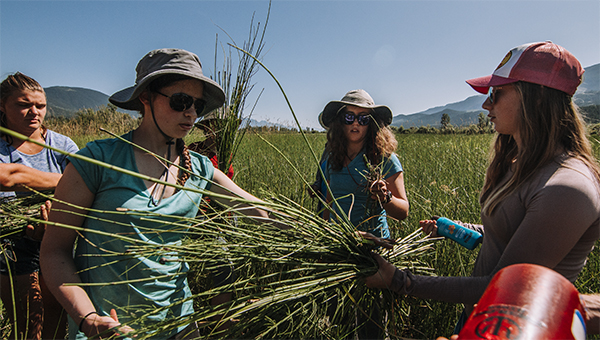Home »

Local youth paddle and learn along the Columbia River
Columbia Basin youth have just returned from a two-week paddle and learning adventure along the mighty Columbia River.
 This is the second year that Wildsight has run the Columbia River Field School, an amazing opportunity for 16 youth ages 15-18 to learn about the complex social, economic and natural history of the Columbia River—all for high school credit.
This is the second year that Wildsight has run the Columbia River Field School, an amazing opportunity for 16 youth ages 15-18 to learn about the complex social, economic and natural history of the Columbia River—all for high school credit.
“This program has changed my life. I came into the Field School with very little knowledge of the Columbia River, expecting to leave somewhat more knowledgeable. But I am leaving with so much more than that,” shared one student. “Not only is my head exploding with new information about the river and the watershed—I am also leaving with strong friendships that reach across the Basin.”
Paddling and camping along key sections of the river, local youth met with 20 guest speakers on both land and water, encouraging participants to think and ask questions about the Columbia River Treaty, dams, reservoirs, electricity generation and their ecological and social impacts. Some of the speakers came from First Nations, local and provincial governments, and some were independent experts, including ecologists, hydrologists, biologists, adventurers, artists and writers.
“The Columbia River Field School is truly authentic, place-based learning, where students follow a journey that focuses on the story of the river and its past, present and future, delving into topics from social studies, science, outdoor education and leadership,” said Wildsight Education Manager Monica Nissen.
 Field School participants were guided and instructed in canoe skills by School District No. 8 teacher Grace Broadfoot and Roger Warnatsch of the Recreational Canoe Association of BC, earning their Lakewater Level 1 and Canoe Tripping Paddler certifications. This included important canoe tripping and camping skills like reading maps, packing, cooking, setting up camp and leave no trace practices to minimize their impact on the land.
Field School participants were guided and instructed in canoe skills by School District No. 8 teacher Grace Broadfoot and Roger Warnatsch of the Recreational Canoe Association of BC, earning their Lakewater Level 1 and Canoe Tripping Paddler certifications. This included important canoe tripping and camping skills like reading maps, packing, cooking, setting up camp and leave no trace practices to minimize their impact on the land.
“A trip highlight was the ‘Future of the River Symposium’ held at Selkirk College. Students met with guest experts to discuss a range of topics, including climate change, the Columbia River Treaty, ecosystem and salmon restoration, and reconciliation,” explained Wildsight Field School Coordinator Graeme Lee Rowlands. “Many students shared that they had never before been in a setting where adult professionals were so genuinely interested in learning from their perspectives and supporting their voices.”
 The Field School took place just weeks before the sixth International Columbia Basin Transboundary Conference meets in Kimberley from September 12-14. The conference will bring together key members of the Columbia River Treaty negotiating team, where the future of the river will be discussed.
The Field School took place just weeks before the sixth International Columbia Basin Transboundary Conference meets in Kimberley from September 12-14. The conference will bring together key members of the Columbia River Treaty negotiating team, where the future of the river will be discussed.
“This program has opened my eyes to the complexities and immense importance of the Columbia River Treaty negotiation, a current issue that has the possibility to greatly impact the area in which I live,” explained a trip participant. “It has made me a more informed citizen about something so many people are unaware of.”
Wildsight would like to thank School District 8, the Columbia Basin Trust, the Royal Bank of Canada (RBC) and the Real Estate Foundation of British Columbia for supporting this program.
Photos submitted
Wildsight







